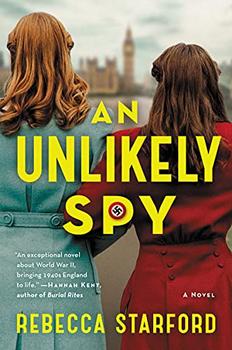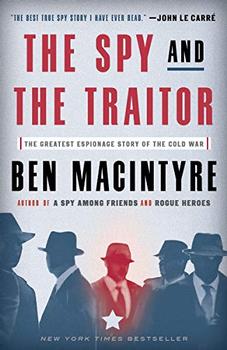Summary | Excerpt | Reviews | Beyond the book | Read-Alikes | Genres & Themes | Author Bio

The Double-Agent War Hero Who Helped Japan Attack Pearl Harbor
by Ronald DrabkinWhen it comes to espionage, not only is truth stranger than fiction, sometimes it can be downright unbelievable. Ronald Drabkin's exceptionally entertaining account of World War I hero Frederick Rutland, Beverly Hills Spy, is all the more jaw-dropping because it's entirely true.
Rutland, a seasoned British pilot, earned distinction in 1916 at the Battle of Jutland by piloting the first airplane to take off from an aircraft carrier. Later in the battle, he dived overboard to save a wounded sailor from drowning, garnering him the Albert Medal, First Class, and an audience with King George V. His compatriots soon bestowed on him the moniker "Rutland of Jutland."
By 1922, however, Rutland's career path hit a snag when the Royal Air Force considered him, at age 30, "too old" for promotion. Drabkin hints that Rutland's crumbling and unorthodox marital situation (living openly with a married woman during their separate divorce proceedings) sealed his promotional chances within a rigidly traditional British society. Frustrated and bitter, Rutland made the fateful decision later that year to approach the Imperial Japanese Navy and offer his services.
Rutland resigned his commission in 1923 and moved to Yokohama, Japan, with his soon-to-be new wife to begin working for Mitsubishi, a private Japanese company. But this was merely a smokescreen for his real employer: the Japanese Navy. His abrupt departure brought him to the attention of the RAF and MI5 (the British security service), who began monitoring his activities. Aware of the suspicions he was raising, Rutland seems to have genuinely believed that "there was nothing at all wrong with anything he was doing." As Drabkin's evidence lays out, however, quite the opposite is true, despite Rutland's repeated protests of innocence.
But what was Rutland doing in Japan? According to a wealth of newly translated Japanese memoirs, Rutland coached Japanese pilots and their staff on how to update the design of aircraft carriers to account for faster and heavier aircraft. Two of those aircraft carriers then under construction—the Akagi and the Kaga—were later used to lead the Japanese attack on Pearl Harbor. After a year in Yokohama, Rutland returned to England and his various business pursuits. But it was that pivotal collaboration in the 1920s that put Rutland on track to become an invaluable—and well-subsidized—intelligence asset for Japan once again.
Drabkin's narrative moves fluidly through the professional and personal transitions in Rutland's life, but really launches off the tarmac in 1933, when Rutland moves to Beverly Hills at the behest of the Japanese in order to gather information on the U.S. Navy. It was then he received his enigmatic codename, "Agent Shinkawa," which means "new river." It was evident to Japanese naval intelligence that "Rutland's ability to hobnob at higher levels" would garner them more valuable information than an attaché ever could. And hobnob he did, as Drabkin reconstructs many of the soirees the Rutlands threw at their lush Hollywood Hills estate (paid for by the Japanese Empire). By the mid-1930s, Rutland was the Japanese Navy's highest-paid agent, with pay "roughly equivalent to ten times that of the highest-paid Japanese admiral."
Rutland's affability and winning charm made espionage easy as he rubbed elbows with Hollywood glitterati like Charlie Chaplin and Boris Karloff, as well as aviation heroes like Amelia Earhart (whom he pumped for information regarding her Lockheed Electra aircraft for his Japanese minders). Drabkin illustrates the slick style Rutland employed at his lavish Beverly Hills parties:
"Rutland had the opportunity to discuss gunnery with a navy captain. Torii [a Japanese agent] had been assigned to find out how accurate the American battleships were when they fired at different ranges, but was unable to accomplish this task before he died. Rutland simply asked one of the U.S. Navy captains about it, mentioning his service spotting for the gunnery of British battleships at Jutland, and got every answer Oka [his handler] wanted—just like that."
While Drabkin's own opinion of Rutland is veiled until the epilogue, he does not pull punches on the various U.S. and British intelligence agencies that "were all on different pages" as they increasingly realized the risk Rutland posed. Even more substantial is Drabkin's revelation that the British, "who had very large files on Rutland," did not tell their American counterparts about him or anything relating to the Japanese espionage happening under Rutland's spy ring. Drabkin cleanly dissects the dysfunctional relationship between the FBI and the U.S. Office of Naval Intelligence (ONI), as well as ONI's failure to prioritize its investigations in the late 1930s, "spending a lot of time looking for Japanese spies and saboteurs inside the U.S., and thereby not focusing on the real threat, which was the Japanese fleet itself."
As his narrative approaches the day of infamy in 1941, Drabkin infuses Rutland's reckoning with time bomb–ticking prose. Interestingly, Drabkin's own family history—both his father and grandfather worked in U.S. counterintelligence—places him in the unique position to tell the tale of "Rutland of Jutland." As he reveals in his epilogue, he is "one degree of separation from most of the characters in the story."
Beverly Hills Spy is a rollicking narrative of brazen spy craft, buttressed with new revelations and insights that will significantly add to studies of Pearl Harbor and WWII military intelligence.
![]() This review was originally published in The BookBrowse Review in March 2024, and has been updated for the
February 2025 edition.
Click here to go to this issue.
This review was originally published in The BookBrowse Review in March 2024, and has been updated for the
February 2025 edition.
Click here to go to this issue.

If you liked Beverly Hills Spy, try these:

by Rebecca Starford
Published 2022
A twisting, sophisticated World War II novel following a spy who goes undercover as a part of MI5 - in chasing the secrets of others, how much will she lose of herself?

by Ben Macintyre
Published 2019
The celebrated author of Double Cross and Rogue Heroes returns with his greatest spy story yet, a thrilling Americans-era tale of Oleg Gordievsky, the Russian whose secret work helped hasten the end of the Cold War.
Not doing more than the average is what keeps the average down.
Click Here to find out who said this, as well as discovering other famous literary quotes!
Your guide toexceptional books
BookBrowse seeks out and recommends the best in contemporary fiction and nonfiction—books that not only engage and entertain but also deepen our understanding of ourselves and the world around us.